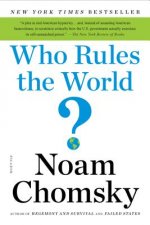
Kód: 04942611
Strategy for Empire
Autor Brian Loveman
The United States Department of Defense has carved the world into five pieces, called unified military commands, maintaining troops and military leadership in each. The geographic boundaries of the unified commands, which together ... celý popis
- Jazyk:
 Angličtina
Angličtina - Väzba: Pevná
- Počet strán: 384
Nakladateľ: Rowman & Littlefield, 2004
- Viac informácií o knihe

186.38 €

Skladom u dodávateľa v malom množstve
Odosielame za 12 - 17 dní
Potrebujete viac kusov?Ak máte záujem o viac kusov, preverte, prosím, najprv dostupnosť titulu na našej zákazníckej podpore.
Pridať medzi želanie
Mohlo by sa vám tiež páčiť
-

Worlds Cause Lawyers Make
49.68 € -

Doing Social Network Research
84.03 € -

Sonic Multiplicities
28.52 € -

Breaking and Shaping Beastly Bodies
52.64 € -

Activity-Based Cost Management: An Executive's Gui Guide
48.96 € -3 % -

Classical Arabic Philosophy
44.06 € -

Miss Carter's War
16.25 € -13 %
Darčekový poukaz: Radosť zaručená
- Darujte poukaz v ľubovoľnej hodnote, a my sa postaráme o zvyšok.
- Poukaz sa vzťahuje na všetky produkty v našej ponuke.
- Elektronický poukaz si vytlačíte z e-mailu a môžete ho ihneď darovať.
- Platnosť poukazu je 12 mesiacov od dátumu vystavenia.
Viac informácií o knihe Strategy for Empire
Nákupom získate 461 bodov
 Anotácia knihy
Anotácia knihy
The United States Department of Defense has carved the world into five pieces, called unified military commands, maintaining troops and military leadership in each. The geographic boundaries of the unified commands, which together encompass the entire globe, 'are set in a way that makes sense to us (the U.S.) for political, military, cultural sorts of reasons,' according to the DOD. Yet outside military and defense circles, the potential impact of post-1990 American strategic reach_or perhaps overreach_has not been given sufficient attention. In Strategy for Empire, Brian Loveman fills that gap by raising the key questions all students should be considering: Even under the perilous conditions imposed by global terrorism, diffusion of weapons of mass destruction, and international 'anarchy,' can the United States afford, and should it seek to justify, assigning responsibility to combatant commanders for every area of the globe and maintaining a military presence in well over 100 countries? Can a foreign policy of preemptive deterrence and covert operations around the globe against terrorists, international criminal organizations, and so-called rogue states be compatible with American constitutional democracy? Or has the United States itself become a rogue superpower, at risk of losing its democratic soul and institutions at home and its moral credibility abroad in its efforts to manage a global empire through regional military commands? This timely reader provides answers to these questions from the perspective of American presidents, policymakers, military officers, establishment think tanks, and critical scholars. The text and accompanying CD collect in one place a synthesis of official and semi-official views of post-1990 regional security agendas and of the evolving perception of post-Cold War threat scenarios. The book begins with President George Bush's 'The National Security Strategy of the United States of America' ( September 2002); then presents the views of military strategists, government policymakers, and 'mainline' think tanks; followed by alternative, critical views from leading experts on U.S. security policy. The accompanying CD sends readers directly to major policy documents and studies described in the text. The CD also includes an extensive bibliography of secondary works that focus on regional security policy during the post-Cold War period. The book and CD combined offer teachers a unique resource, providing a wealth of stimulating material for the classroom that is sure to promote critical thinking and spark lively discussion and debate.
 Parametre knihy
Parametre knihy
Zaradenie knihy Knihy po anglicky Society & social sciences Politics & government International relations
186.38 €
- Celý názov: Strategy for Empire
- Podnázov: U.S. Regional Security Policy in the Post-Cold War Era
- Autor: Brian Loveman
- Jazyk:
 Angličtina
Angličtina - Väzba: Pevná
- Počet strán: 384
- EAN: 9780842051767
- ISBN: 0842051767
- ID: 04942611
- Nakladateľ: Rowman & Littlefield
- Hmotnosť: 649 g
- Rozmery: 234 × 186 × 26 mm
- Dátum vydania: 28. July 2004
Obľúbené z iného súdka
-

On Palestine
10.62 € -18 % -

Prisoners of Geography
11.13 € -23 % -

World Order
11.34 € -24 % -

International Relations, Global Edition
109.18 € -

Grand Chessboard
23.51 € -

Diplomacy
16.45 € -24 % -

Clash of Civilizations and the Remaking of World Order
16.76 € -15 % -

Hundred-Year Marathon
16.55 € -22 % -

The Spy and the Traitor
10.93 € -24 % -

Understanding the Intelligence Cycle
77.90 € -

Who Rules the World?
11.24 € -25 % -

Who Rules the World?
14.20 € -18 % -

Dead Aid
16.66 € -9 % -

World Order
16.45 € -3 % -

Adults In The Room
13.08 € -22 % -

Legacy of Ashes
17.88 € -14 % -

Evolution of Cooperation
19.11 € -

Strategic Vision
16.14 € -21 % -

Secret World
18.29 € -24 % -

Geopolitics and Geoculture
22.07 € -35 % -

Dawn of Eurasia
12.26 € -23 % -

How Spies Think
10.93 € -24 % -

Gaza in Crisis
12.26 € -23 % -

Planetary Cycles Mundane Astrology
19.82 € -

OVERTHROW : AMERICA'S CENTURY OF REGIME
21.05 € -23 % -

Is the EU Doomed?
24.73 € -

Directorate S
20.13 € -6 % -

Righteous Victims
20.44 € -19 % -

Europe's Border Crisis
45.28 € -

America's Strategy in World Politics
73.30 € -

Destroying Libya and World Order
19.82 € -1 % -

My Nationalist Pony
36.80 € -

Critical Practices in International Theory
217.46 € -

amantes del fin del mundo
23.51 € -

American Century and Beyond
20.44 € -18 % -

Heroic Failure
12.57 € -13 % -

Oxford Handbook of the European Union
57.76 € -

Rise and Kill First
16.45 € -24 % -

PEACE TO END ALL PEACE
21.05 € -23 % -

Tragedy of Great Power Politics
21.46 € -9 % -

Countdown to Zero Day
16.86 € -17 % -

Revenge of Geography
18.39 € -21 % -

Political Order and Political Decay
16.55 € -23 % -

Naked Diplomat
14.41 € -23 % -

Against Our Better Judgment
13.18 € -

After the Empire
15.94 € -

Legacy of Ashes
20.85 € -23 % -

Dragons and the Snakes
32.09 € -10 % -

Oxford IB Diploma Programme: Global Politics Course Book
58.27 €
Osobný odber Bratislava a 2642 dalších
Copyright ©2008-24 najlacnejsie-knihy.sk Všetky práva vyhradenéSúkromieCookies


 21 miliónov titulov
21 miliónov titulov Vrátenie do mesiaca
Vrátenie do mesiaca 02/210 210 99 (8-15.30h)
02/210 210 99 (8-15.30h)